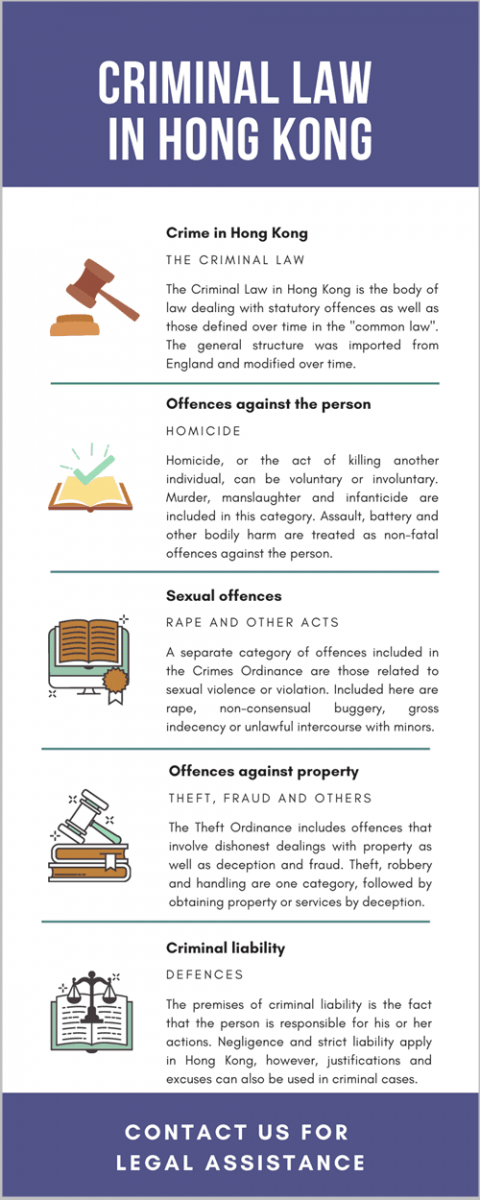Criminal law in Hong Kong is largely based on the UK law and it is different from the one applied in Mainland China. The relevant sources of law are essential and specific parts of the Basic Law of the Hong Kong SAR, namely the Crimes Ordinance (Cap 200), the Criminal Procedure Ordinance (Cap 221) and the Organized and Serious Crimes Ordinance (Cap 455), among others.
Our immigration lawyers in Hong Kong can give you details on how the laws apply to expats.
The Secretary for Justice conducts criminal prosecutions in Hong Kong and he is the one who will rule a case shall be prosecuted or not. In this evaluation, the Secretary takes into consideration issues like public interest and whether or not the evidence is sufficient to justify the proceedings.
In practice, simple offences are handled by the Police or other bodies and will not require the express involvement of the Secretary. The Magistrates Courts and Senior Court Prosecutors who act on behalf of the Secretary handle these less serious cases.
The Court of First Instance of the High Court by a jury handles serious criminal offences such as murder, rape, armed robbery and some drug offences. The District Court deals with more serious criminal cases except for murder, manslaughter and rape. The District Court judge sits without a jury in criminal trials.
An accused individual who is not content with the magistrate’s decision can apply to the same magistrate (within 14 days) for a review of a decision. If he is still not satisfied, he may appeal using the usual route, by means of submitting the appeal to the Court of First Instance (applying directly to the Court of First Instance is also an option, with no mandatory need to first ask for a review from the magistrate).
The Juvenile Court is the one to receive cases in which young individuals (children under the age of 14 years or adolescents between 14 and 16 years) have been charged with an offence other than homicide. In these cases, a permanent magistrate seating is especially constituted.
The criminal law in Hong Kong is enforced in a manner that will guarantee the preservation of important legal rights such as the presumption of innocence, the right to legal representation as well as the burden of proof that falls onto the prosecution.
An individual can be tried and convicted by the courts in Hong Kong for an offence that was committed within the territory of the Special Administrative Region.
Having accurate legal counsel and representation in Hong Kong is surely helpful in all cases, irrespective of thy involve offences against other individuals or property. Our team of lawyers in Hong Kong is ready to assist you if you are involved in criminal or civil proceedings.
Table of Contents
Criminal Law in Hong Kong – a general overview
The Crimes Ordinance and the Criminal Procedure Ordinance are two important legal resources used to define criminal offences as well as their treatment in court. These Ordinances, along with others, make up the base for the statutory provisions related to criminal offences. They are interpreted and applied by judges in particular cases.
Criminal Law in Hong Kong has two main sources: the common law and the subordinate legislation or ordinances. Common law refers to the decisions of judges that have taken place in common law courts.
Criminal liability can be roughly divided into offences against the person and offences against property. Below, our team of lawyers in Hong Kong offer more details:
- Homicide: voluntary and involuntary manslaughter, constructive or reckless manslaughter as well as homicide in case of gross negligence cases (included here is death caused by dangerous driving);
- Non-fatal offences: assault and aggravated assault, battery, assaulting a police officer who is on duty, wounding and grievous bodily harm with and without intent;
- Sexual offences: involving sexual violence or violation, rape, unlawful sexual intercourse, abduction offences, indecent assault, sexual exploitation, soliciting and others;
- Theft, robbery and handling: the Theft Ordinance deals with the theft of property belonging to another party, appropriation, dishonesty, and intention of permanently depriving, robbery and the handling of stolen goods;
- Deception and fraud: obtaining a pecuniary advantage and obtaining property, obtaining services and evading liability, false accounting, and fraud.
Our team can give you more details if you wish to understand these in the context of immigration to Hong Kong.
All of these offences relating to criminal law in Hong Kong can be described in greater detail by our team of lawyers.

The Hong Kong Crimes Ordinance
The offences covered by criminal law in Hong Kong can be largely described as the ones included in the Crimes Ordinance. In summary, these are the following:
- Treason: treasonable offences that are liable to conviction and the person can be subject to imprisonment;
- Piracy and offences at Sea: piracy with violence, piratical acts, trading with pirates, the application of criminal law on high seas, etc.
- Intimidation and perjury: threatening another person, false statements in criminal proceedings, with reference to marriage, birth or death as well as in many other cases;
- Incest: incest by men or women, the test of the relationship as well as the prosecution of offences;
- Explosive substances: the attempt to cause explosion, making or possessing explosives, causing explosions likely to endanger life or property;
- Forgery and counterfeiting: the offence of forgery, using false instruments, making false entries, intend to defraud, aiders and abettors, etc.
- Sexual and related offences: rape, non-consensual buggery, buggery with mental incapacitated persons, indecent assault, bestiality, abduction, abduction for sexual intercourse and many other cases;
- Miscellaneous offences: loitering, access to computer with dishonest or criminal intent.
Please keep in mind that these types of offences only serve as general guidelines of those included under the criminal law in Hong Kong. Our team of local lawyers can give you more details.
We invite you to watch a video on the main offences under the Criminal Law:
The rights of the convicted individual as per the Criminal Law in Hong Kong
An individual charged with a criminal offence as well as one convicted of such a crime retains a set of rights as per the law in force. Our lawyers in Hong Kong briefly highlight these below:
- the right to be presumed innocent until proven guilty;
- to be informed of the nature and cause of the charge promptly, in detail and in a language he can understand;
- have adequate time and facilities to prepare the defense and take on counsel of his own choosing;
- to be tried without undie delay, in his presence and to defend himself in person or through legal assistance of his own choosing;
- to examine the witnesses against him;
- to benefit from free assistance from an interpreter if he cannot understand/speak the language used in court;
- not be compelled to testify against his wishes or confess guilt;
- for juveniles, the procedure will take into account one’s age an promoting rehabilitation;
- when convicted, the individual has the right to have his conviction or sentence reviewed by a higher tribunal;
- when an individual has been subject to a miscarriage of justice and wrongfully accused, he has the right to be compensated according to law (unless the undisclosed fact that has led to his pardoning is wholly or partly attributable to him);
- not to be tried or punished again for an offence for which one has already been finally convicted or acquitted according to the law of Hong Kong.
The aforementioned presumption of innocence is a key factor in the Hong Kong criminal justice system. When or if guilt is not proves, then the accused must be acquitted.
Another governing rule for criminal proceedings is that the prosecution has the burden of proof: showing beyond reasonable doubt that the accused is at fault. When the prosecution fails to do, so, then the matter is considered not proven and the accused can be acquitted. The prosecution retains the burden of proof throughout the entire trial – the accused is convicted only if the judge/jury is satisfied that the prosecution has proved all the elements of the offence.
For criminal cases in Hong Kong, the standard of proof is beyond reasonable doubt – the jury must be sure that each event existed or occurred (this also applies in case of facts or state of mind).
Our immigration lawyers in Hong Kong can help temporary residents who have questions about their rights.
In some cases, treated as exceptions, the burden of proof falls onto the defendant and in this case the standard of proof is the one referring to the balance or probabilities – lower standard. In this case, the judge or jury needs to be satisfied that the event is more likely than not to have existed or occurred.
There are two common law exceptions applicable in cases involving various crimes that deserve mentioning:
- Insanity: when the defendant is not sane or was not sane at the time the crime took place; in this case the burden of proof is reversed and falls onto the defendant with the aforementioned standard of proof;
- Negative averments: this relates to statutory offences and in this case the defendant must prove that he falls within the stated exception, as applicable (proving authority by showing that one fits within the exception).
Our lawyers in Hong Kong can provide more details about these rights and exceptions. As needed, our litigation lawyers can help those who were accused of a crime with legal representation in court.
Evidential burden is the requirement to provide evidence during a trial. This is a burden that can rest on either party. The prosecution is not required to disprove all defenses, only those raised and supported by evidence.
According to the Hong Kong Police Force, the following crime statistics apply for the years 2019 and 2020:
- Overall crimes in 2019 January – March: 12,755;
- Overall crimes in 2020 January – March: 16,422;
- Persons arrested for crime in the same period in 2019: 1,460;
- Persons arrested for crime in the indicated period in 2020: 1,670.
Have you been convicted of a crime and are in need of information about criminal law in Hong Kong?
Contact our law firm in Hong Kong for more information on criminal and civil prosecution as well as legal representation in court.
You can also contact us if you need information about immigration to Hong Kong.

